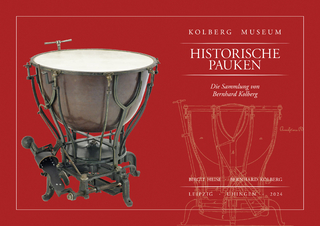
Kika Kila
How the Hawaiian Steel Guitar Changed the Sound of Modern Music
Seiten
2020
The University of North Carolina Press (Verlag)
978-1-4696-5909-1 (ISBN)
The University of North Carolina Press (Verlag)
978-1-4696-5909-1 (ISBN)
Since the nineteenth century, the distinct tones of kk kila, the Hawaiian steel guitar, have defined the island sound. Here historian and steel guitarist John Troutman offers the instrument's definitive history, from its discovery by a young Hawaiian royalist named Joseph Kekuku to its revolutionary influence on American and world music.
Since the nineteenth century, the distinct tones of kk kila, the Hawaiian steel guitar, have defined the island sound. Here historian and steel guitarist John W. Troutman offers the instrument's definitive history, from its discovery by a young Hawaiian royalist named Joseph Kekuku to its revolutionary influence on American and world music. During the early twentieth century, Hawaiian musicians traveled the globe, from tent shows in the Mississippi Delta, where they shaped the new sounds of country and the blues, to regal theaters and vaudeville stages in New York, Berlin, Kolkata, and beyond. In the process, Hawaiian guitarists recast the role of the guitar in modern life. But as Troutman explains, by the 1970s the instrument's embrace and adoption overseas also worked to challenge its cultural legitimacy in the eyes of a new generation of Hawaiian musicians. As a consequence, the indigenous instrument nearly disappeared in its homeland.
Using rich musical and historical sources, including interviews with musicians and their descendants, Troutman provides the complete story of how this Native Hawaiian instrument transformed not only American music but the sounds of modern music throughout the world.
Since the nineteenth century, the distinct tones of kk kila, the Hawaiian steel guitar, have defined the island sound. Here historian and steel guitarist John W. Troutman offers the instrument's definitive history, from its discovery by a young Hawaiian royalist named Joseph Kekuku to its revolutionary influence on American and world music. During the early twentieth century, Hawaiian musicians traveled the globe, from tent shows in the Mississippi Delta, where they shaped the new sounds of country and the blues, to regal theaters and vaudeville stages in New York, Berlin, Kolkata, and beyond. In the process, Hawaiian guitarists recast the role of the guitar in modern life. But as Troutman explains, by the 1970s the instrument's embrace and adoption overseas also worked to challenge its cultural legitimacy in the eyes of a new generation of Hawaiian musicians. As a consequence, the indigenous instrument nearly disappeared in its homeland.
Using rich musical and historical sources, including interviews with musicians and their descendants, Troutman provides the complete story of how this Native Hawaiian instrument transformed not only American music but the sounds of modern music throughout the world.
John W. Troutman is Curator of American Music at the National Museum of American History.
| Erscheinungsdatum | 31.12.2019 |
|---|---|
| Zusatzinfo | 14 colour plates, 51 halftones |
| Verlagsort | Chapel Hill |
| Sprache | englisch |
| Maße | 178 x 229 mm |
| Gewicht | 710 g |
| Themenwelt | Kunst / Musik / Theater ► Musik ► Instrumentenkunde |
| Sachbuch/Ratgeber ► Geschichte / Politik ► Allgemeines / Lexika | |
| Geisteswissenschaften ► Geschichte ► Allgemeine Geschichte | |
| Geisteswissenschaften ► Geschichte ► Regional- / Ländergeschichte | |
| ISBN-10 | 1-4696-5909-3 / 1469659093 |
| ISBN-13 | 978-1-4696-5909-1 / 9781469659091 |
| Zustand | Neuware |
| Haben Sie eine Frage zum Produkt? |
Mehr entdecken
aus dem Bereich
aus dem Bereich
Roman
Buch | Hardcover (2024)
Wallstein Erfolgstitel - Belletristik und Sachbuch (Verlag)
20,00 €
die Sammlung von Bernhard Kolberg
Buch | Hardcover (2024)
E Reinhold (Verlag)
39,00 €


